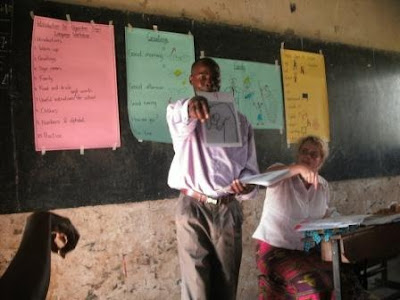

The views expressed in this blog are of the individuals concerned and do not represent the views of VSO


 Teachers practising the sign for chalk - it starts with pointing at white teeth (Ugandan sign language in case any of our readers speak British Sign Language)
Teachers practising the sign for chalk - it starts with pointing at white teeth (Ugandan sign language in case any of our readers speak British Sign Language) Emmanuel and Hannah showing us how to do it properly
Emmanuel and Hannah showing us how to do it properly Practice makes perfect
Practice makes perfect Geoff wishes that he got this much concentration when he used to do assemblies!
Geoff wishes that he got this much concentration when he used to do assemblies! A practical first aid demonstration
A practical first aid demonstration Headteachers working together to think of ways to improve health in their schools.
Headteachers working together to think of ways to improve health in their schools. Isaac has just gone into the final year of primary School, P7, and he helped me with the equipment.
Isaac has just gone into the final year of primary School, P7, and he helped me with the equipment. 
Not a very satisfactory answer, perhaps, but one that works for us.
Next week is our workshop for promoting healthy schools and we found it difficult to stay positive when one of our funders withdrew their money 7 days before. It was too late to cancel as we had already sent out the invites, bought the resources we were going to distribute and printed the participants handbook. So with some last minute juggling we managed to sort things out but it puts further workshops in jeopardy if we cannot replace the lost funds.
Of course when the going gets tough the tough go shopping, so here is Sabrina with the jerrycans to make hand washing facilities for the attending schools and cotton wool for the first aid kits we will be handing out!


